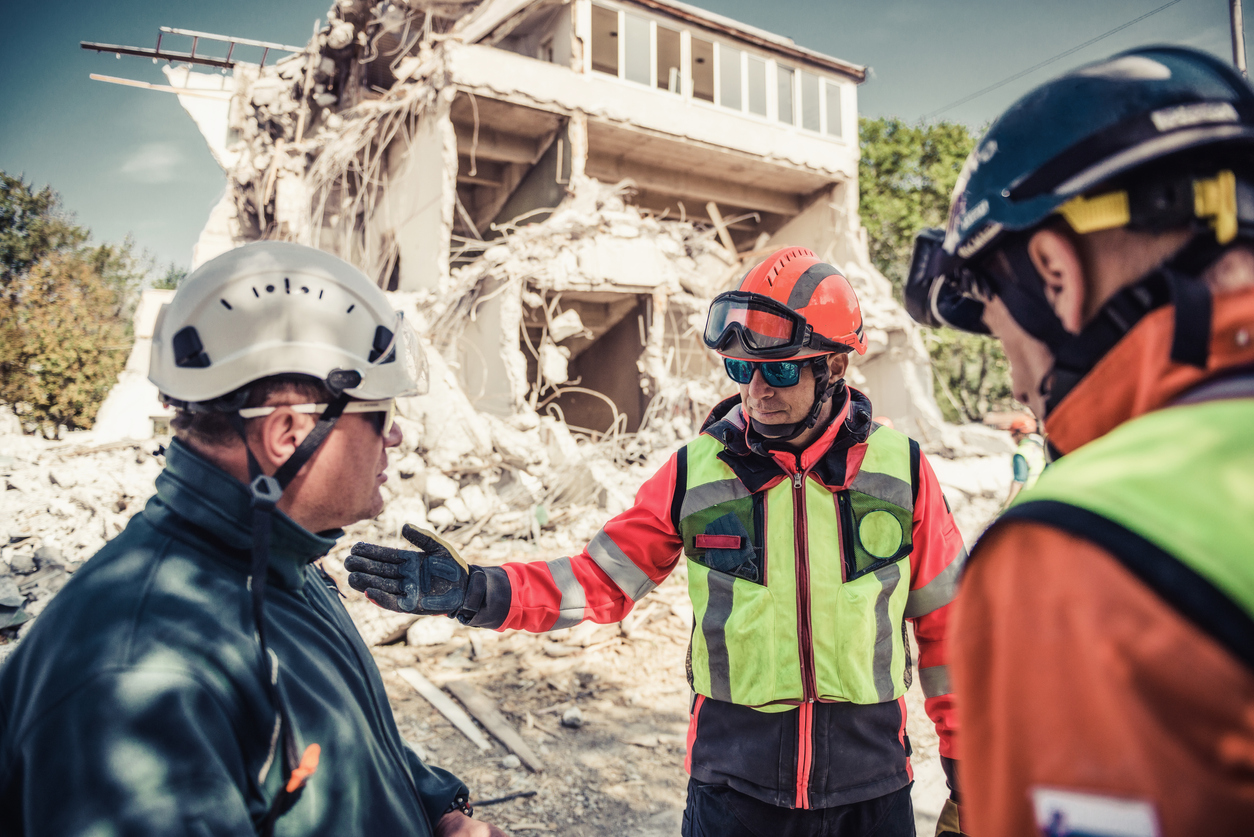Emergency Management Director: Job Description and Salary
Written by: Hilbert College • Jan 4, 2024

Emergency Management Director: Job Description and Salary ¶
Natural disasters take a significant toll on communities and their resources. There were 25 weather- and climate-related disasters in the first 10 months of 2023 that each caused over $1 billion in damages, according to data from the National Oceanic and Atmospheric Administration. Among the catastrophes, flooding and severe storms were the highest ranking and costliest natural disasters.
With increases in these types of events, communities and government agencies need professionals to implement crisis plans, communicate information and ease tension in storm-ravaged communities. Emergency management directors take charge when disasters happen. They use their leadership, critical thinking and communication skills to supervise and orchestrate responses to disasters.
Those who are interested in a career in emergency management should understand the intricacies of the role, as well as the education and experience requirements for pursuing an advanced position, such as an emergency management director.
What Does an Emergency Management Director Do? ¶
When a disaster occurs, emergency management directors oversee the response and perform post-event assessments to determine next steps. As part of their leadership role, they create emergency protocols and policies, make recommendations, develop new response strategies and execute procedures.
Common duties include:
- Developing emergency response plans
- Collaborating with public safety officials, private companies and government agencies on response efforts
- Engaging with the community by delivering updates, receiving feedback and forming partnerships
- Allocating and supervising the distribution of resources, such as supplies, funding, equipment and personnel
- Ensuring the safety of affected communities
- Conducting training sessions for community members, government officials and first responders
- Reviewing damage assessment reports
- Directing and assigning volunteer projects
While emergency management entails emergency preparedness, disaster recovery and hazard mitigation, this career can also be impacted by cybercrimes. Many emergency agencies enlist the help of cybersecurity agencies to thwart attacks that could disrupt an emergency response center.
Where Do Emergency Management Directors Work? ¶
According to the U.S. Bureau of Labor Statistics (BLS), 56% of emergency management directors work for the local government. They also work in state government (15%); hospitals (5%); colleges, universities and professional schools (3%); and professional, scientific and technical services (3%).
While directors typically work in an office, they’re often called upon to travel to community agencies, government offices and private companies. Their responsibilities are similar, whether they are employed in private or public sectors.
Emergency Management Director Education and Skill Requirements ¶
A bachelor’s degree in a field such as security and protective service, public administration, government, emergency management or business is needed for entry-level positions in emergency management. Earning an advanced degree, such as a master’s in criminal justice administration or emergency management, can provide additional training and skills through courses, such as program planning, organization management and causes of crime.
Before being hired as a director, these professionals need several years of experience. Experience can be gained in the military, law enforcement or another emergency management position. Emergency management directors may also need to be certified. Common credentials include the Certified Emergency Manager (CEM) and Certified Business Continuity Professional (CBCP).
Aside from education and experience, directors need a distinct set of skills to work well under pressure.
Critical thinking ¶
Emergency management directors use their critical thinking skills to foresee and prepare for disasters and hazards. In times of stress, they need to consider other professionals’ perspectives and make well-informed decisions.
Leadership ¶
Strong leadership skills are important to motivate and guide teams, train personnel and take charge during high-pressure situations. Emergency management directors must be capable leaders to oversee disaster response efforts and stay organized.
Crisis management ¶
Crisis management entails planning, coordinating and implementing emergency plans when disaster strikes. Emergency management directors need to coordinate resources, maintain response plans and ensure speedy responses.
Problem-solving ¶
Various challenges will arise when crises like pandemics, earthquakes and other emergencies appear. Problem-solving skills are important so that directors can develop effective plans, make last minute decisions, modify existing plans and propose practical solutions.
Communication ¶
When critical information needs to be disseminated, directors must have superb written and verbal communication skills. Clear communication is needed to explain critical information to the public, volunteers, government officials, employees and other emergency personnel.
Emergency Management Director Salary and Job Outlook ¶
Emergency management directors earned a median annual salary of $79,180 as of May 2022, according to the BLS. While this figure is the median wage, the actual salary for this may depend on location, employer, industry, education and experience. For example, directors in the professional, scientific and technical services sector earned a median salary of $106,000, while those working in state, local and private hospitals earned $93,540.
Emergency management directors are projected to have a 3% job growth from 2022 to 2032, according to the BLS. While many of the job openings projected are due to retiring workers, emergency personnel are needed for their expertise during and after national disasters.
Discover How Hilbert College Can Train You to Become an Emergency Management Director ¶
Becoming an emergency management director begins with a bachelor’s degree, but a master’s degree can give professionals a needed boost to advance their knowledge of theory, management and regulations. Hilbert College Global offers an online Master of Science (MS) in Criminal Justice Administration degree program that prepares prospective directors on public administration trends, social control and investigations.
If you want to stand out from the competition, find out how earning an online MS in Criminal Justice Administration degree from Hilbert College Global can prepare you to achieve your professional goals.
Recommended Readings
Types of Criminal Justice Degrees: BA vs. BS
What Can You Do With a Criminal Justice Degree?
6 Criminal Justice Career Fields for Graduates
Sources:
Indeed, What Does an Emergency Management Director Do?
National Centers for Environmental Information, Billion-Dollar Weather and Climate Disasters
USA Facts, Disasters And Emergency Relief?
U.S. Bureau of Labor Statistics, Emergency Management Directors
ZipRecruiter, What Is an Emergency Management Director and How to Become One


